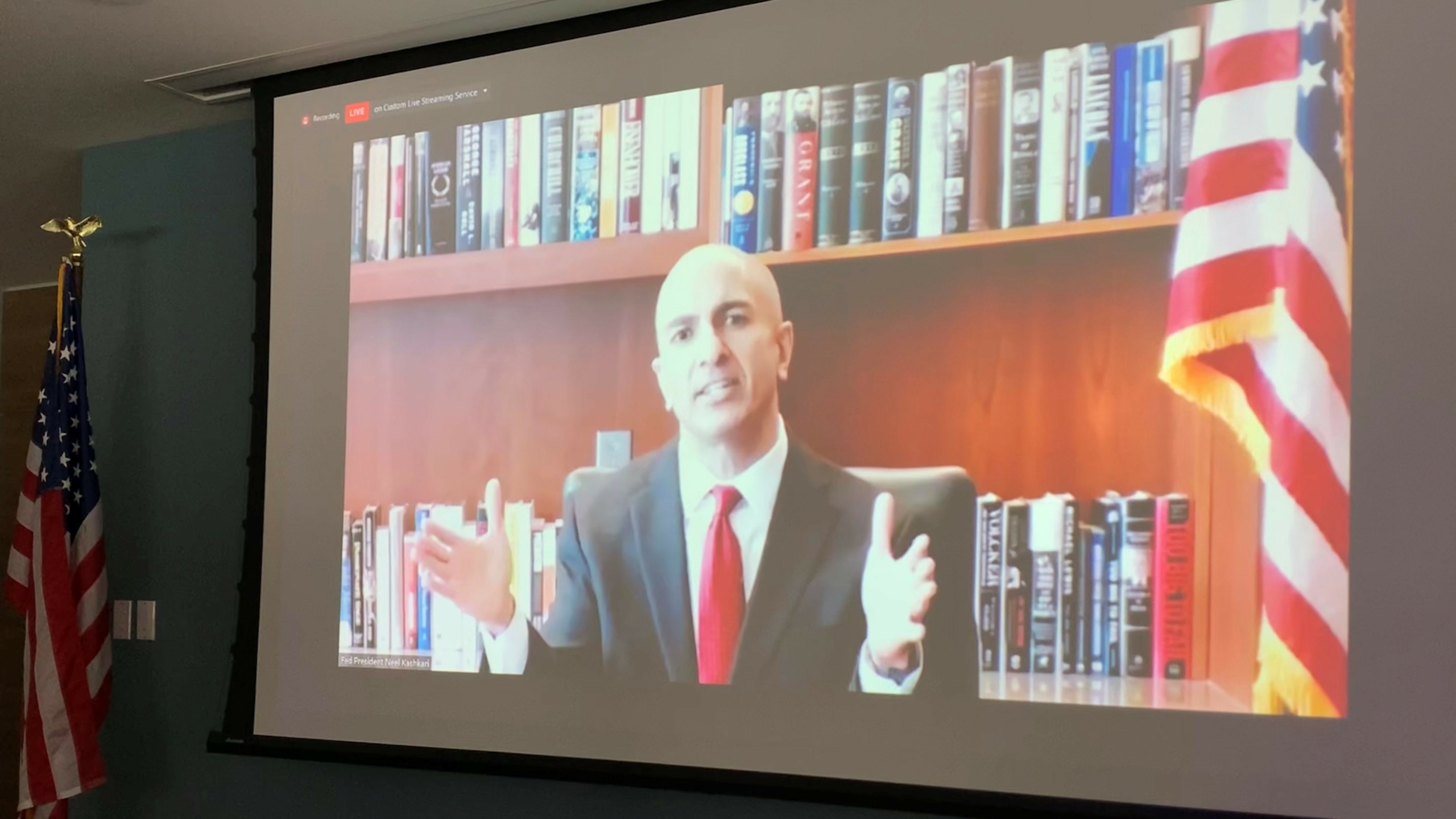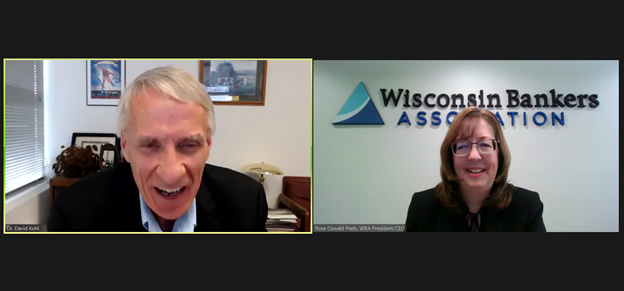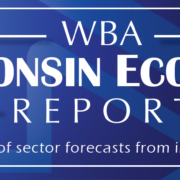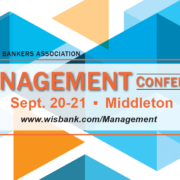Inflation, Global Supply Chains, and Labor Top the List of 2022 Economic Trends to Watch
Minneapolis Fed President Neel Kashkari and Economist Dr. David Kohl Headline Midwest Economic Forecast Forum
By Cassandra Krause, Wisconsin Bankers Association
On January 4, the Wisconsin Bankers Association hosted the 2022 Midwest Economic Forecast Forum in partnership with the Illinois Bankers Association, Michigan Bankers Association, Minnesota Bankers Association, Montana Bankers Association, and South Dakota Bankers Association. The event kicked off with a presentation by Minneapolis Federal Reserve Bank President and CEO Neel Kashkari. His presentation was followed by a town hall-style Q & A, moderated by WBA President and CEO Rose Oswald Poels. The conversation included topics such as the conditions in sectors like manufacturing, agriculture, and construction; the Fed’s dual mandate from Congress; supply chains; an influx in bank deposits; and Community Reinvestment Act (CRA) modernization.

Minneapolis Fed President Neel Kashkari
Wisconsin’s Recovery Slower Than Minnesota’s, But Regional Recovery Mirrors That of the Nation
Kashkari said that overall, our region looks a lot like the nation, but there are differences. Wisconsin started recovering more quickly than Minnesota did, but then the recovery became slower over the last six months to year. What happens with COVID will continue to matter because workers getting sick will be a disruption to economic activity.
Kashkari noted that economic recovery since initial COVID-19 shutdowns has been uneven. “On one hand, GDP is fully recovered. . . but different sectors have been affected differently,” said Kashkari. “Many workers have found jobs. . . and while the unemployment rate has come down, we are still about 4–6 million workers short of where we should be, had there been no pandemic.”
Demand for Labor Has Recovered More Quickly Than Supply
The labor market was one of the main topics Kashkari responded to in the Q & A.
“One of the things that I learned before the pandemic was that the vast majority of Americans want to work,” said Kashkari. “Every time businesses told us ‘we’re out of workers,’ as wages started to climb, workers came back in, and that was resoundingly positive for everyone. . . I still believe that’s true.”
Kashkari commented that people of all income levels have more savings and more options — and there’s still a lot of fear of getting COVID or bringing it home to a vulnerable family member. The demand for labor has come back, but it’s going to take longer for people to feel comfortable coming back into the job market.
Two Rate Hikes Likely in 2022
With regard to inflation, Kashkari predicted it will be transitory, though it has been higher and has lasted longer than he had expected. He referred to his essay, titled “Two Opposing Risks,” which was published just prior to his presentation, and said he foresees two interest rate hikes this year. The rate rises may require sacrificing some gains in employment in order to keep inflation under control.
Role of Banks in Communities Highly Appreciated
Kashkari highlighted how community banks stepped up powerfully through the Paycheck Protection Program. “[Banks] have managed exceptionally well during the pandemic,” he said, adding that he has nothing but admiration for community banks and the role they served. WBA’s Oswald Poels expressed gratitude on behalf of community bankers for the recognition of their efforts.

Dr. David Kohl and Rose Oswald Poels
Economic Mega Trends 2022 and Beyond
Dr. David Kohl, a highly anticipated speaker at events hosted by WBA and state banking associations around the country, discussed ten global macro-economic mega trend disruptors. The renowned economist and professor emeritus at Virginia Tech also responded to audience questions in a dialog moderated by Oswald Poels.
Disruptors Present Both Challenges and Opportunities
Some of the major disruptors Kohl highlighted in his presentation were globalization; environmental, social, and governance (ESG); and technology and automation. He provided a recent historical overview of inflation and provided a watch list for short- and long-term inflation. “Uncertainty concerning inflation, geopolitics, supply and marketing chains creates challenges but also presents opportunities,” said Kohl. “This is true for businesses and individuals with a high business and financial IQ that follow the process and execute a business plan.”
Global Perspective Key to Success
Kohl gave an overview of markets around the globe to keep an eye on, including Asia/China and Europe/Russia. “’Think globally, but act locally’ is a theme for success in the decade of the 2020s,” advised Kohl. “Observe economic mega trends from afar and connect the dots to determine how they impact your bank, business, employees, and customers’ lives.”
Wisdom for Banking
Like any good educator, Kohl had words of wisdom to share with the audience beyond what can be found in textbooks and data reports. “Success in life and business is about managing the controllables and managing around the uncontrollables,” he explained. “From the board room to business front lines, one cannot manage what happens in Washington, D.C., Beijing, or Brussels, but can attempt to manage around uncontrollable factors using scenario planning. Focus energy and strategy on the controllable elements with tactics that are agile and adaptive given the economic landscape.”
If you were unable to attend the live broadcast, you can still register to receive access to the recording through January 18, 2022 plus resources provided by Kashkari and Kohl.
Wisconsin Experts Offer Sector Forecasts
As an extension of the Midwest Economic Forecast Forum, WBA has compiled eight sector-specific reports from industry experts on what 2022 will hold for Wisconsin. The reports include insights from Rose Oswald Poels, Wisconsin Bankers Association; Robb Kahl, Construction Business Group; Kevin Krentz, Wisconsin Farm Bureau Federation; Brandon Scholz, Wisconsin Grocers Association; Eric Borgerding, Wisconsin Hospital Association; Kurt Bauer, Wisconsin Manufacturers & Commerce; Michael Theo, Wisconsin Realtors Association; and Tom Still, Wisconsin Technology Council.
To read the full Wisconsin Economic Report, please visit wisbank.com/2022forecast.







